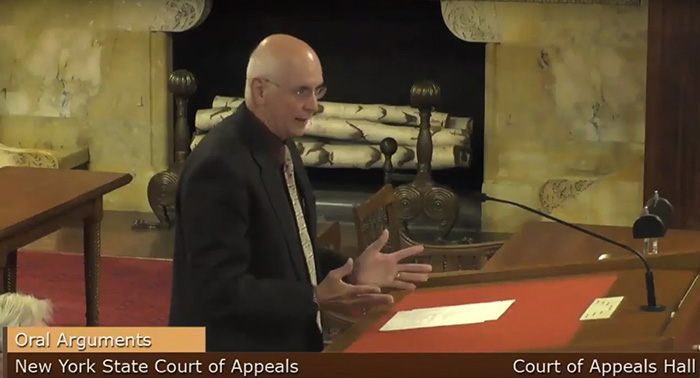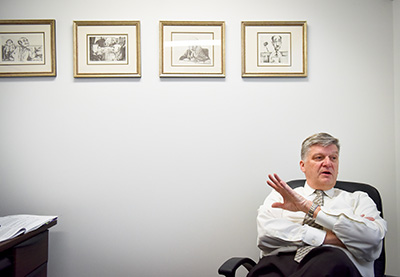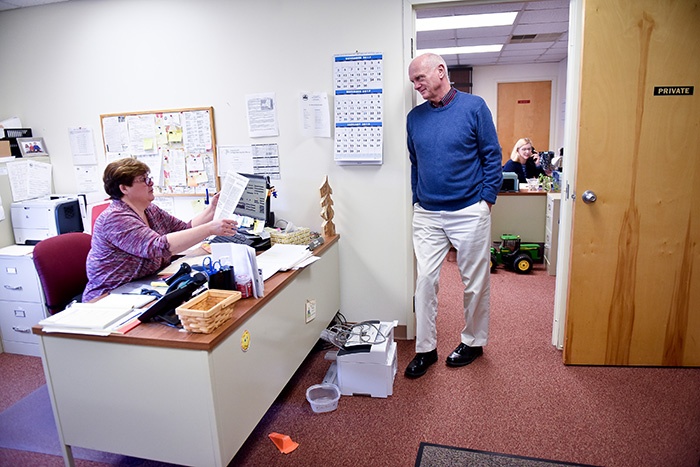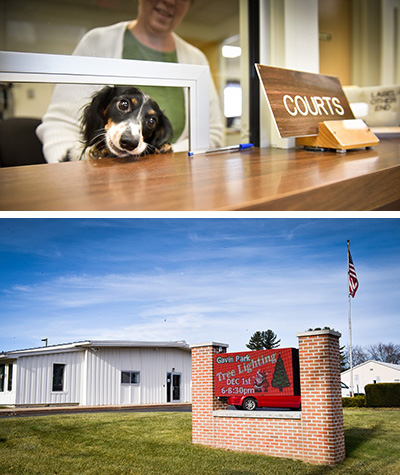Are Times Changing for NY's Old-School Town and Village Courts?
New York's town and village justices operate under a system devised for a prior century, and many have had their struggles with judicial discipline. But they tend to be popular in the communities they serve, offering a brand of justice that may not be expected from high-volume courts based in urban areas and county seats.
May 13, 2018 at 08:00 PM
15 minute read

A Conklin town justice who used his prestige to try and fix his daughter's traffic ticket for driving while talking on a cellphone is just one example of an enduring issue for the state's court system: how to deliver justice in the state's vast rural areas and ensure its judges are qualified, capable and adhere to high standards, even if they aren't required to be lawyers.
And while numerous reform efforts for the state's town and village courts, devised in a previous century for a far different New York state, have failed to make lasting systemic changes, observers of the state's judiciary say times are changing.
According to a New York Court of Appeals decision, after unsuccessful attempts to lean on another judge and a court clerk to have his daughter's case transferred to the judge he wanted, Town of Conklin Justice J. Marshall Ayres—who is not an attorney—appeared in court as his daughter's advocate for a pretrial conference and reminded the courtroom just who he was.
“If this was in my courtroom, I'd dismiss it,” Ayres told a prosecutor, who said she felt “extreme pressure” to dismiss the ticket and complied, according to the state Court of Appeals' ruling in October to bounce Ayres from the bench.
In another case, Jacques Michel, a Rockland County village justice, resigned in June after just one year on the bench after it was revealed that his record included a nearly four-decade-old felony immigration fraud conviction.
There's also a case of a jurist turned jilted lover: Rose Town Court Judge Gary Poole agreed to step down after 24 years on the bench amid complaints that he was behaving belligerently toward an ex-girlfriend who had moved on, threatening her with prosecution and telling her that he would coax the woman's ex-husband into waging a child custody battle with her if he didn't get his stuff back.
These are just a few instances from the past few years in which small-town New York justices, who for years have been the targets of the majority of the disciplinary rulings that the state's Commission on Judicial Conduct issued against New York judges, left the bench for misconduct.
And in each of these examples, the judges were not lawyers.
From the beginning of 2017 through April 30, the Commission on Judicial Conduct has considered roughly 3,000 complaints against judges statewide and has issued 11 sanctions— which include censure, admonition, resignation and removal from the bench—and reached stipulations in 11 other cases, which have included judges agreeing to step down from the bench and agreeing to never again seek office.
Sixteen of the 22 total depositions concerned nonlawyer judges presiding over New York's town and village courts, also known as “justice courts.”
These small-town courts, which have been in existence since before the founding of the U.S. government, are afforded a degree of autonomy by the fact that local communities sign the judges' checks, not the state court system.
According to the judicial conduct commission, more than 1,110 of the state's roughly 1,850 town and village justices are nonlawyers (New York has more than 3,100 total judges on the bench). Many of the justices serve on the bench part-time, making ends meet by working as farmers, teachers or postal carriers.
To be sure, judges who become subject to determinations by the commission make up a small fraction of New York judges, and having a law degree is no guarantee that a judge won't run afoul of the commission, said Richard Emery, a name partner at Emery Celli Brinckerhoff & Abady who served on the judicial commission for 13 years until departing last May.
“There can be excellent nonlawyer judges and there can be poor lawyer judges,” he said.
But generally speaking, Emery said, a legal background can help judges stay out of trouble. In the case of the town and village justices, legal training can help the justices think more independently and set aside their ties to their communities, which are sometimes the same towns where the judges themselves were born and bred.
The close bonds that the small-town judges have with their communities may lead some to rely on what they personally know about those who appear before them and their reputations, rather than relying on the evidence presented, Emery said.
“Sometimes nonlawyers don't have a lot of respect for the due process rights of the people who come before them,” Emery said. “Sometimes they don't have the training that leads them to be independent from the pressure of small towns.”
Small-Town Justice
New York is among a shrinking number of states that have not only maintained town and village courts, but that also give judges without law degrees the power to seize property and jail defendants.
But most of the matters that come before the justices of the peace are traffic cases, which come in a steady stream for courts situated along major roadways like the New York State Thruway corridor.
But the judges are also tasked with handling criminal cases and preside over eviction proceedings; they can set bail, imprison people for up to a year and boot tenants out of rental properties.
The courts have been targeted by critics and reformers at various times over the past century.
Back in 1927, a state commission on crime decreed that the “most unsatisfactory feature of the administration of criminal law in this state today is the obsolete and antiquated institution known as the justice of the peace.”
But despite reformers' best efforts, the courts have proven to be a stubborn fixture of the state's justice system that—while proving to be open to changes other than requiring judges to get their law degrees—appears to be here to stay.
In a more recent example, in 2007, a New York City Bar Association task force recommended a requirement that town and village justices who preside over pretrial suppression hearings and jury trials have a law degree.
“It just makes no sense for the state of New York to be invested in a system that was designed for another century,” said Norman Effman, a defense attorney in Wyoming County in western New York who served on the task force.
But the courts tend to be popular in the communities they serve, offering a brand of justice that may not be expected from high-volume courts based in urban areas and county seats.

“People feel it's better to get the local flavor of the local farmer or the pharmacist,” said Town of Moreau Justice Timothy Alden, who is himself a lawyer with his own practice; Alden's fellow justice in Moreau, New York, Jeffrey McCabe, a former police officer, is not a lawyer.
Like many communities along Interstate 87, or the Adirondack Northway, Alden's court pulls in a considerable amount of its business from motorists passing through the area.
The same is true for the nearby Town of Wilton, where Justices Gerald Worth and David Towne—who are both nonlawyers—preside.
Towne, a former sheriff's office criminal investigator who was elected to the bench in 2011, splits his time between the court, working as a real estate broker and coaching a recreational basketball team for sixth and seventh graders. He's soft-spoken and small-town friendly, quick with a smile and handshake, but carries the no-nonsense demeanor of a former cop.
“In my opinion, the best judges that I've encountered were [ex-]law enforcement,” Towne said.

Towne said that, because of the 32 years he spent in law enforcement, becoming a judge was a seamless transition, other than the fact that it was bit strange at first to don the robe and have people call him “Your Honor”: Going into the job, he had a good working knowledge of the law and had spent plenty of time in court.
But being a good judge isn't all about laying down the law and “seeing things in black and white,” he said. He says he tries to be empathetic toward the defendants who come before him, and that he gets frustrated by recidivists. In addition to knowing the law, he said, being effective on the bench also requires being able to think on one's feet.
“This isn't for everyone,” Towne said. “You can be a lawyer and be book-smart and not be good for the job.”
Alden said that, because of the growing complexity of the law, more lawyers are presiding over town and village courts, but said that keeping nonlawyers on the bench remains a popular proposition for some communities.
And the courts can provide significant revenue for the communities they serve. In calendar year 2016, the justice courts raked in more than $249.8 million combined, according to a report by the New York State Comptroller's Office.
But Town of DeWitt Justice David Gideon, the president of the New York State Magistrates Association who has been a lawyer for 33 years and who has served on the bench for about 18 years, said he doesn't believe that money motivates town and village justices.
With respect to the disparity in conduct commission rulings targeting town and village justices, Gideon said the difference lies in the fact that town and village justices make up roughly 60 percent of the 3,150 judges in New York.
Gideon said he doesn't see a connection between sanctions for judges and whether or not they have law degrees: some nonlawyer judges are more apt to ask for help if they aren't knowledgeable on a subject, while some of his fellow J.D.s tend to “shoot from the hip.”
“I think all of the judges take this job to heart and take it very seriously,” Gideon said.
And, as Gideon notes, downstate judges and those who sit in larger cities in New York have run into their share of trouble.
For instance, the judicial conduct commission recently called for the removal of Queens Civil Court Judge Terrence O'Connor, who was facing proceedings before the commission for his belligerent manner toward attorneys and witnesses in his courtroom and issuing sua sponte awards of counsel fees without giving attorneys a chance to challenge whether or not the fees were appropriate.
But aside from his courtroom conduct, O'Connor didn't do himself any favors with his actions before the commission: as he angrily stormed out of the proceedings he could be heard calling the commission a “fucking clown show.”
Another judge with a J.D. whose conduct has grabbed headlines is Rochester City Court Judge Leticia Astacio, who has faced a torrent of legal woes since her August 2016 conviction for driving while intoxicated.
On top of two violations of her conditional sentence for the conviction, she was arrested in April for allegedly trying to make an illegal firearms purchase from a Dick's Sporting Goods in Henrietta. On April 24, the commission recommended that she be removed from the bench.
Addressing 'Second-Tier' Justice
But Gideon and court system officials think things are different these days for town and village justices.
Since 2006, when due process violations in some of the town and village courts and myriad other issues were highlighted in a New York Times expose—which raised concerns about a “second-tier” justice system—Office of Court Administration officials and the state bar got to work on action plans to outline ways to improve the courts and protect defendants' rights.
Among the issues the Times uncovered in the report was a case in which a North County woman went to a village judge seeking an order of protection from her physically abusive husband.
The judge denied the request, adding that a woman “needs a good pounding every now and then.”
It also cited the case of Thomas Buckley, a town and village justice in Clinton County who was ordered removed from the bench in 2000.
According to one of several complaints submitted to the judicial conduct commission, Buckley found his neighbor guilty of harboring a dangerous dog in a case in which Buckley was himself the complaining witness and, after seeing the dog running loose, issued an order to have the animal put to death.
The Times also highlighted instances in which defendants were denied their rights to counsel in cases where they were being threatened with jail time, which had also been the case in one of the complaints against Buckley.
According to an action plan developed by OCA in the months following publication of the Times' series that called for myriad improvements and changes for the town and village courts, some of the small-town justices were not aware of a 2005 order from the court system that if a justice assigns bail to a defendant who cannot afford to pay it, counsel must be assigned on the spot.
Though the report acknowledged that providing indigent defense can be vexing for some of the town and village courts, given the number of courts and the distance that lies between them in New York's river towns and bucolic hamlets.
Following the recommendations contained in the action plan, the court system invested more in training for the small-town judges and made technological upgrades to their courts, such as doling out recording devices to the courts to record proceedings, which can help judges avoid getting their rulings flipped on appeal or getting them dragged in front of the judicial conduct commission.
With the courts becoming more dependent upon technology, Gideon said, some of the older judges are “calling it day,” which is allowing a new crop of justices to move in.
“I think some of the older judges have said, 'Enough, I've done my service and I'm going to retire,'” Gideon said.
Effman, the longtime public defender, said he and other attorneys can attest to the improvements to the town and village courts in recent years.

Gone are the days, he said, when he would appear before a judge sitting at a card table set up in an abandoned church lit with a single naked lightbulb, and more of the rural courthouses are looking more like “real courthouses,” with benches for judges and proper jury boxes.
In the old days, Effman said, it was also more common for nonlawyer judges to defer to prosecutors when they weren't up to speed on an issue—now, OCA has a 24/7 hotline that judges can call for advice.
Alden's courtroom in the Town of Moreau, for instance, somewhat resembles a hotel conference room—well-lit with grayish carpeting and padded chairs for the galley, but with the obvious difference of police officers and sheriff's deputies escorting beshackled prisoners in orange jumpsuits to a holding room where they wait to be called before the judge.
But more important than improved technology and aesthetics, Effman said, is that he sees an increasing number of defendants showing up to court with attorneys.
“With a lawyer there, there's less likely to be inappropriate conduct by a town justice,” Effman said.
This year, the State Bar issued a new set of recommendations for improving the town and village courts, including diversity training for judges, better record-keeping of attendance for judges and clerks and random audits of judges' written records.
But it did not recommend—as many commissions had before it—that the justices of the peace head to law school.
Emery, the former member of the judicial conduct commission, said in an “ideal world” all judges would be lawyers, but said the reality is that there might not be enough lawyers available to take the bench and mete out small-town justice.
“I'm not sure we would be able to mount a judiciary upstate if we require judges to be lawyers,” he said.
This content has been archived. It is available through our partners, LexisNexis® and Bloomberg Law.
To view this content, please continue to their sites.
Not a Lexis Subscriber?
Subscribe Now
Not a Bloomberg Law Subscriber?
Subscribe Now
NOT FOR REPRINT
© 2025 ALM Global, LLC, All Rights Reserved. Request academic re-use from www.copyright.com. All other uses, submit a request to [email protected]. For more information visit Asset & Logo Licensing.
You Might Like
View All
Big Law Sidelined as Asian IPOs in New York Are Dominated by Small Cap Listings

The Benefits of E-Filing for Affordable, Effortless and Equal Access to Justice
7 minute read
A Primer on Using Third-Party Depositions To Prove Your Case at Trial
13 minute read
Shifting Sands: May a Court Properly Order the Sale of the Marital Residence During a Divorce’s Pendency?
9 minute readTrending Stories
- 1Some Thoughts on What It Takes to Connect With Millennial Jurors
- 2Artificial Wisdom or Automated Folly? Practical Considerations for Arbitration Practitioners to Address the AI Conundrum
- 3The New Global M&A Kings All Have Something in Common
- 4Big Law Aims to Make DEI Less Divisive in Trump's Second Term
- 5Public Notices/Calendars
Who Got The Work
J. Brugh Lower of Gibbons has entered an appearance for industrial equipment supplier Devco Corporation in a pending trademark infringement lawsuit. The suit, accusing the defendant of selling knock-off Graco products, was filed Dec. 18 in New Jersey District Court by Rivkin Radler on behalf of Graco Inc. and Graco Minnesota. The case, assigned to U.S. District Judge Zahid N. Quraishi, is 3:24-cv-11294, Graco Inc. et al v. Devco Corporation.
Who Got The Work
Rebecca Maller-Stein and Kent A. Yalowitz of Arnold & Porter Kaye Scholer have entered their appearances for Hanaco Venture Capital and its executives, Lior Prosor and David Frankel, in a pending securities lawsuit. The action, filed on Dec. 24 in New York Southern District Court by Zell, Aron & Co. on behalf of Goldeneye Advisors, accuses the defendants of negligently and fraudulently managing the plaintiff's $1 million investment. The case, assigned to U.S. District Judge Vernon S. Broderick, is 1:24-cv-09918, Goldeneye Advisors, LLC v. Hanaco Venture Capital, Ltd. et al.
Who Got The Work
Attorneys from A&O Shearman has stepped in as defense counsel for Toronto-Dominion Bank and other defendants in a pending securities class action. The suit, filed Dec. 11 in New York Southern District Court by Bleichmar Fonti & Auld, accuses the defendants of concealing the bank's 'pervasive' deficiencies in regards to its compliance with the Bank Secrecy Act and the quality of its anti-money laundering controls. The case, assigned to U.S. District Judge Arun Subramanian, is 1:24-cv-09445, Gonzalez v. The Toronto-Dominion Bank et al.
Who Got The Work
Crown Castle International, a Pennsylvania company providing shared communications infrastructure, has turned to Luke D. Wolf of Gordon Rees Scully Mansukhani to fend off a pending breach-of-contract lawsuit. The court action, filed Nov. 25 in Michigan Eastern District Court by Hooper Hathaway PC on behalf of The Town Residences LLC, accuses Crown Castle of failing to transfer approximately $30,000 in utility payments from T-Mobile in breach of a roof-top lease and assignment agreement. The case, assigned to U.S. District Judge Susan K. Declercq, is 2:24-cv-13131, The Town Residences LLC v. T-Mobile US, Inc. et al.
Who Got The Work
Wilfred P. Coronato and Daniel M. Schwartz of McCarter & English have stepped in as defense counsel to Electrolux Home Products Inc. in a pending product liability lawsuit. The court action, filed Nov. 26 in New York Eastern District Court by Poulos Lopiccolo PC and Nagel Rice LLP on behalf of David Stern, alleges that the defendant's refrigerators’ drawers and shelving repeatedly break and fall apart within months after purchase. The case, assigned to U.S. District Judge Joan M. Azrack, is 2:24-cv-08204, Stern v. Electrolux Home Products, Inc.
Featured Firms
Law Offices of Gary Martin Hays & Associates, P.C.
(470) 294-1674
Law Offices of Mark E. Salomone
(857) 444-6468
Smith & Hassler
(713) 739-1250






